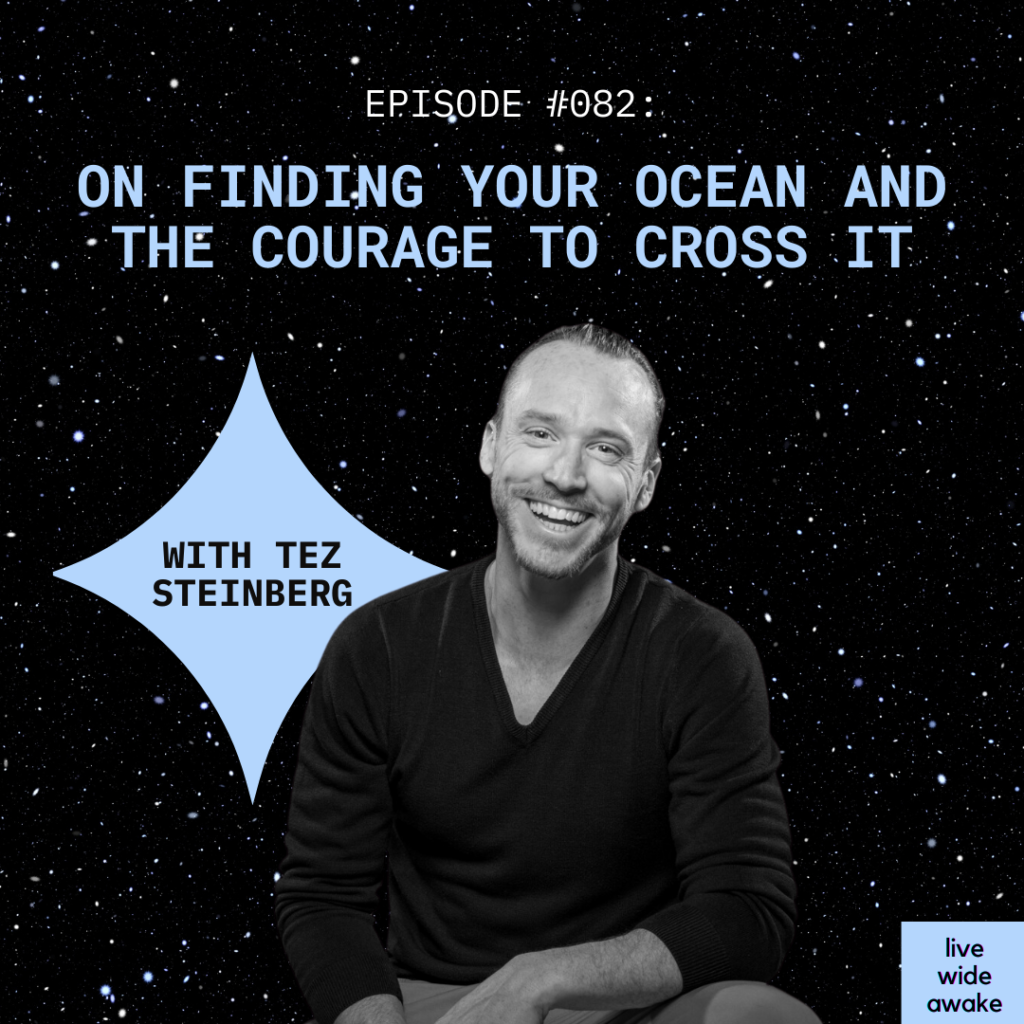If you’re not familiar with Tez Steinberg, he’s the first person in history to row across the Pacific Ocean alone from California to Hawaii with no prior rowing experience. The journey took 71 days and 2,700 miles, powered by sheer will and two oars.
On Episode 82 of Live Wide Awake, Tez Steinberg shares his journey of rowing across the ocean and the lessons he learned about solitude, perseverance, and personal growth. He discusses the challenges he faced and the mental tools he used to overcome them. Tez also explains his motivation for embarking on a second expedition to raise awareness about ocean plastic and shares how people can support his mission. Ultimately, Tez encourages listeners to live wide awake and make the most of their time on Earth.
Tez was also named one of the “50 Best Young Minds in the World” by the World Economic Forum and you can see why. Hearing his story of resilience, determination and simple yet precise wisdom blew me away.
In this article, we talk about what Tez means about how we all have an “ocean” to cross, moments of wanting to give up but continuing, tools and practices for overcoming challenges, and more.
- He almost gave up on Day 3 of his expedition
Tez contemplated quitting on day 3 when his phone reset, a sentiment lingering from day 7 to day 12 and persisting throughout the first month. The challenges of ocean rowing, requiring meticulous rescue planning, presented an undesirable option. Opting for rescue by a passing vessel meant abandoning the boat and belongings for a journey with only a passport and credit cards. This choice seemed unappealing, given the substantial time and money invested in the boat over three years, along with public and social commitments and responsibilities to sponsors and backers.
While facing the urge to quit, Tez felt accountable to project investors. He established a rule: quitting is allowed, but not on that day. This mental trick helped him empathise with struggles, normalise aversion, and focus on making the current day positive. He avoided thoughts about completing the journey, centred on enjoying the present, and embraced the unpredictability of the journey, savouring each day as a potential last.
- The Ocean as a Metaphor for Life
Tez, within the realm of ocean rowing, sees it as a metaphorical journey. He doesn’t advocate for individuals to undertake the challenge of rowing across an ocean unless they genuinely desire it. In fact, if someone expresses interest, he might even try to dissuade them. Currently preparing for his upcoming ocean row, Tez reflects on how he wishes he had dissuaded himself from it earlier. Nevertheless, he sees ocean rowing as a metaphor for life’s challenges. Just as waves wash overboard in ocean rowing, individuals face challenges in their lives and must decide how to respond.
He encourages the idea that everyone has their own metaphorical ocean to cross. This could involve necessary conversations, unfulfilled business aspirations, or desires for professional advancement. Though seemingly smaller in scale compared to rowing across an ocean, these challenges represent personal callings, passions, or curiosities. Tez emphasises that people often neglect these inclinations, letting life pass by without pursuing what truly matters.
- Tez’s Tools and Practices for Overcoming Challenges Are Simple
Tez emphasised the significance of mental strength, stressing the importance of consistent practice, drawing a parallel between the mind and a muscle. He firmly believed that improvement is a product of repetition and unwavering dedication to putting in the necessary work. Reflecting on his personal journey, Tez revealed that an initial inspiration for undertaking the challenge of rowing across an ocean came from a film. However, this wasn’t his first exposure to the concept of ocean rowing.
A few years into his exploration of endurance sports, Tez came across a TED Talk where someone discussed the feat of rowing across oceans. At that time, he dismissed the idea, doubting his ability to achieve such a remarkable feat. Undeterred, he continued to test his limits through intense ultramarathons and Ironmans. It wasn’t until he encountered the idea of ocean rowing again, following a substantial period of personal growth, that he recognized he could accomplish it with the right decision.
Tez admitted that his younger self would never have believed he could row across an ocean when he first learned about it. In the intervening period, he pursued exceptionally challenging goals. When selecting new races, he intentionally chose those that made him uncomfortable, aiming to exceed his initial expectations tenfold. This deliberate approach provided him with substantial evidence of his capabilities, propelling him to new levels of achievement.
- His Experience of Solitude
For the most part, Tez really enjoyed it. He recalls that sometimes it’s easy to view things through rose-tinted lenses. The first month of the expedition was genuinely awful for him. It was truly the hardest month of his life. Ocean rowing was so much harder than he could have possibly imagined. And so even though he had all this experience with endurance sports and things, it was child’s play compared to being alone in the ocean. But by the end of the expedition, he loved it.
And no matter what, whether it was a moment where he was intimidated or overwhelmed or other moments where he was elated, grateful, excited, and feeling in flow, none of those points made him feel lonely. And he thinks that’s an important distinction. He could be with himself; he could be alone but not feel lonely. He felt scared or intimidated and, at times, would have liked to have shared that burden with somebody else, but it wasn’t because he was lonely or lacking company.
And one thing he learned over many years is to be his own best friend. How can he be his own best friend? We’re all in our own boat with ourselves at the end of the day. And we have our crew, we have our community, we have the people we count on, and we’re in our fleets together; we have our friends that go out. But at the end of the day, he’s in his boat with himself. And who does he get to be to provide company, support, and fun for himself? That was a challenge that he really liked.
- His Reflections on Death and Motivation
Discovering the profound impact of mortality when his father passed away prompted him to reflect on the finite nature of time. This contemplation inspired him to embark on an ocean-rowing journey, highlighting how such experiences can lead individuals down different paths, with death acting as a powerful teacher. Tez firmly believes that acknowledging the inevitability of death empowers people to live more purposeful and awakened lives.
He notes that the fear of death often stems from living incongruently with one’s values or feeling dissatisfied with life choices. Tez empathises with this fear, recognizing life’s overwhelming nature. He points out a prevalent comfort crisis, where people prioritise daily convenience and comfort. While acknowledging the importance of comfort, Tez emphasises that when life revolves entirely around it, there’s a significant sacrifice of meaning, purpose, impact, connectivity, and legacy.
Tez argues that people shy away from confronting the reality of death because it serves as a stark reminder that they may not be proud of how they’ve utilised their limited time.
By the way….

Prepare for an immersive journey into the profound wisdom imparted by Tez on Live Wide Awake, hosted by our founder, Stephanie. Episode #82, available on Spotify, invites you to delve into Tez Steinberg’s captivating story. Brace yourself for a tidal wave of inspiration as Tez shares a truly motivating story of his journey that will undoubtedly leave a lasting impact.


